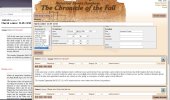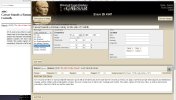Re: Historical Events Database
Thanks, that's good to know. One of the last (and major) steps before publication will certainly be that people with a 'fresh pair of eyes' will look at every single entry, read it in full, and do any of the following: approve, fix and approve, or reject. Hopefully more people will help out with that.
For now, we still have to enter more data, fix formatting and 'beef up' citations so that none of the entered data are ambiguous.
Regarding the latter point, ambiguousity due to poorly formatted citations, I think I'll have to go in and change how the database application works one more time. One of the things I haven't foreseen from the beginning was that several citations would be used for each event. So today I'm going to experiment with the following: instead of the free-text, general-purpose Quote and Notes fields, the meanings of which was always a bit blurry, and which have been used differently by each contributor, I'll try to make all sources (books, articles, web) and multiple quotations into separate logical entities. I'll report back later when I've found out more.
Approaching Infinity said:I haven't had much time this past week or two. But KJN and I will be glad to help out with copy-editing and formatting. We'll give peeps here a chance to go over their entries first, then we'll plug in and no doubt have lots of questions. But with some effort, we can get it done!
Thanks, that's good to know. One of the last (and major) steps before publication will certainly be that people with a 'fresh pair of eyes' will look at every single entry, read it in full, and do any of the following: approve, fix and approve, or reject. Hopefully more people will help out with that.
For now, we still have to enter more data, fix formatting and 'beef up' citations so that none of the entered data are ambiguous.
Regarding the latter point, ambiguousity due to poorly formatted citations, I think I'll have to go in and change how the database application works one more time. One of the things I haven't foreseen from the beginning was that several citations would be used for each event. So today I'm going to experiment with the following: instead of the free-text, general-purpose Quote and Notes fields, the meanings of which was always a bit blurry, and which have been used differently by each contributor, I'll try to make all sources (books, articles, web) and multiple quotations into separate logical entities. I'll report back later when I've found out more.





